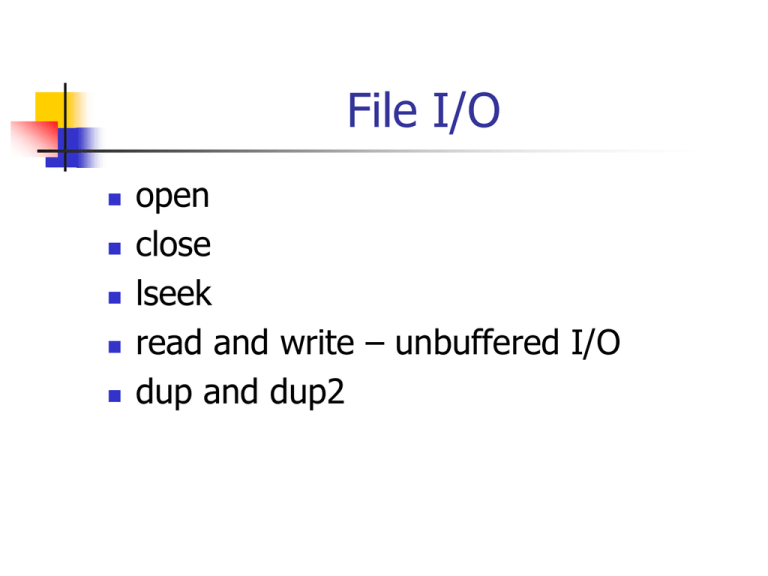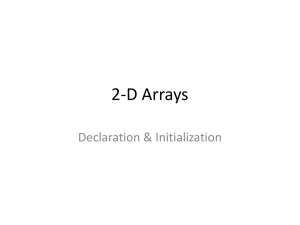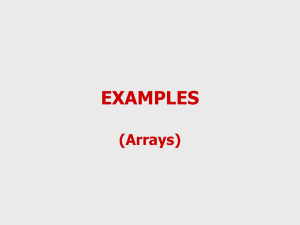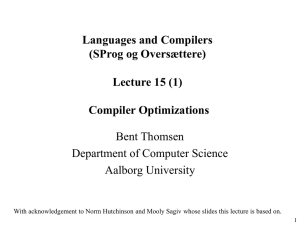File I/O
advertisement

File I/O
open
close
lseek
read and write – unbuffered I/O
dup and dup2
File Descriptors
Kernel maintains file descriptors to
reference open files
Non-negative integer
The shell defines 3 by convention
stdin 0
stdout 1
stderr 2
Open
Functions defined in <unistd.h>
open function
int open(const char *pathname, int flags);
int open(const char *pathname, int flags, mode_t mode);
Open (cont)
Required Flags
O_RDONLY
O_WRONLY
O_RDWR
Useful Optional Flags
O_APPEND
O_CREAT
O_EXCL (used with O_CREAT to cause the open
function to fail if file already exists)
O_TRUNC
Open Example
int fd;
fd = open(“data.txt”, O_RDONLY |
O_CREAT | O_TRUNC, mode);
if(fd < 0) {
perror(“Unable to open file”);
exit(1);
}
creat
creat function
int creat(const char *pathname, mode_t mode);
Same as using open with O_WRONLY |
O_CREAT | O_TRUNC, mode)
close
close function
int close(int fd);
Returns 0 on success or -1 on error
Kernel will close any file descriptors left
open by a process when it exits
lseek
lseek function
off_t lseek(int fildes, off_t offset, int whence);
Returns current file offset if sucessful,
otherwise -1
whence
SEEK_SET – Sets offset from beginning of file
SEEK_CUR – Relative offset from current position
SEEK_END – Sets offset past end of file
Unbuffered I/O - read
read function
ssize_t read(int fd, void *buf, size_t count);
Reads count bytes from the file
indicated by the file descriptor fd into
the buffer pointed to by buf
Returns -1 on error, 0 on end of file and
number of bytes read otherwise (may
be less that the number requested)
Unbuffered I/O - write
write function
ssize_t write(int fd, const void *buf, size_t count);
Attempts to write out count bytes from
buffer buf to file indicated by file
descriptor fd.
Returns -1 on error, number of bytes
written otherwise
Buffer Size and Efficiency
Program in Fig 3.4 page 69
Table in Fig 3.5 page 70
File Sharing
Multiple processes can access a file
simultaneously
3 Kernel level data structures are used
to keep track of file information
Process table
File table
v-node
See Fig 3.6 and 3.7 on pages 72, 73
Atomic Operations
Appending to a file
Separate lseek and write operations can
result in race conditions
Open file with O_APPEND to force an
atomic seek to end of file before each write
Creating a file
Separate check for file existence and
creation can result in race condition
Use both the O_CREAT and O_EXCL flags
dup and dup2
Both are functions for duplicating a file
descriptor within a process and return -1 on
error
dup
int dup(int oldfd);
Returns a new fd that points to the same entry in
the file table
dup2
int dup2(int oldfd, int newfd);
Returns newfd which now points to the same
entry in the file table as oldfd
fcntl
Allows us to change properties of an
already opened file
Several uses. See page 78 for more info
All return -1 on error, but meaning of
other return types depends on specific
use
ioctl
int ioctl(int d, int request, ...);
Catchall for I/O functions that don’t fit
well in other headers.










